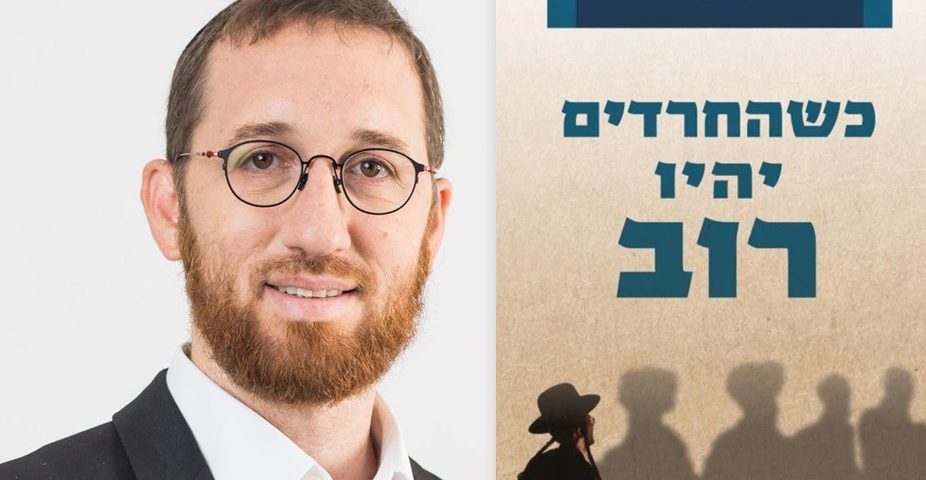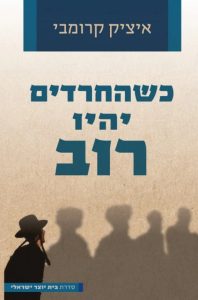Alt+SHIFT: When Haredim Rule

Yitzchak Blau concludes this summer’s supplementary Alt+SHIFT series in which he’s offered a look into trends, ideas, and writings in the Israeli Religious Zionist world, helping readers from the Anglo sphere gain insight into worthwhile material available only in Hebrew. See the archive of all past columns in this series—and stay tuned for the return of our “Unpacking the Iggerot” and “The BEST” columns in September.
 Yitzik Crombie, Kesheha-Haredim Yihyu Rov (Yediot Books), 350 pp.
Yitzik Crombie, Kesheha-Haredim Yihyu Rov (Yediot Books), 350 pp.
The ongoing controversy in Israel regarding “sharing the burden” and drafting Haredim to the IDF makes Yitzik Crombie’s book three-year-old book simultaneously out of date and very timely. Crombie, a Chabadnik who works in hi-tech, has been involved in several projects encouraging Haredim to enter the workforce. The Hebrew volume, whose English title is given as Israel’s Future with an Ultra-Orthodox Majority, divides its discussion into four categories. After an opening chapter exploring the Haredi ideology of isolationism and its role in preserving Jewish values, the next three chapters address that society’s attitudes to education, the army, and the economy.
Crombie forthrightly acknowledges that, as Haredim become a larger percentage of the population, they will have to become more involved in academic studies, serving in the IDF, and leaving kollel for the company office. Not only does a modern state need doctors, lawyers, and engineers (to say nothing of foot soldiers), but their growing share of the population will mean the economy will no longer be able to shoulder the financial burden of giving Haredim a pass from military and mercantile responsibility—even would it wish to do so. Crombie does not mention that one rarely hears such an admission from Haredi leadership.
The many initiatives to advance such trends have not borne much fruit. Despite three large conferences on Haredim and hi-tech, there has not been a massive upsurge of Haredim in that line of work. Numerous attempts at creating Haredi-friendly army units have generated a trickle of inductees, many of whom were already dropouts from the Haredi educational system. In fact, it turned out that the IDF had been exaggerating the number of Haredi recruits to make the project seem more successful than reality. Almost half of Haredi men who enter an academic track give up before finishing a B.A (a dropout rate almost twice that of the general population). While 86% of non-Haredi men work, only 52% of Haredi men do so. Why have various attempts failed?
Crombie divides up the responsibility and we will begin with the Haredi side. The Haredim, especially the men, study little to no math and English which puts them far behind in the job market. Their society valorizes full-time kollel study, so social pressure (including impact on shidduchim for one’s self and his children) redirects those with potential and inclination to enter the work-force back to the benches of the beit midrash. Non-Haredim see professional life as the norm and are motivated to overcome hardships along the way; Haredim see kollel as the default and revert back to it when things turn challenging. They often enter the academic universe at a later than average age when they are already tasked with caring for families and many children. Hovering over all of this is the fear of the outside world and its perceived threats to their value structure.
Particular aspects of Haredi ideology create more barriers. The idea that human effort cannot change the amount of money God decrees for a person lessens the motivation for hard work. A disrespect for the wisdom of the outside world means that Haredim may think that business success does not depend on experience or training. Haredi literature does not focus on years of dedication and effort enabling balebatim to earn a living which might provide a model for readers to emulate.
According to Crombie, several other groups also contribute to the failures. The Israel Women’s Network (Shedulat Nashim) presents legal challenges to any attempts at gender segregation in higher education, thereby discouraging Haredi enrollment in academic programs. Well-meaning educators who lower standards for Haredi students are guilty of the “racism of low expectations” and ultimately hurt their graduates. The army sometimes creates unnecessary conflicts. Does three weeks of training for the Home Front truly need to include tours of Har Herzl and Ammunition Hill as well as lectures on Zionism? Finally, the workplace could be more of a neutral space where everyone’s individual beliefs are left alone.
The book contains several other fascinating discussions. One passage attempts to dispel the eternal mystery of how Haredi families survive economically (247–248). Another section conveys how Chabad does not fit the standard Haredi paradigms. The need to provide a salary inspired Haredi seminaries to expand training for women beyond the field of education. This did not happen in Chabad seminaries since the men of Chabad by and large all work, so families face less financial pressure, paradoxically keeping women in a narrower array of professions.
This is an important book, and took courage to write since it likely will not help the author’s popularity in the Haredi orbit. Nonetheless, I find that I cannot agree with its even-handed presentation. It seems to me that in the final analysis the responsibility for the current impasse lies at the feet of Haredi society, notwithstanding secular Israel’s own failings to integrate the Haredim in army, higher education, or the workforce.
One particular passage, written before October 7th, took on new resonance during the current conflict, and it is an insightful way to end this review and our Alt+SHIFT summer series:
There are situations in which one has to draft everybody to the ranks of fighting forces, and there are situations where this is not necessary. When there is a security need for each soldier, saving lives and the sanctity of life overcome all other values; however when there are enough soldiers and security needs are met, Torah learners are needed for their spiritual role, which is crucial for the Jewish people (194).
Yitzchak Blau, Rosh Yeshivat Orayta in Jerusalem’s Old City, is an Associate Editor of TRADITION.
